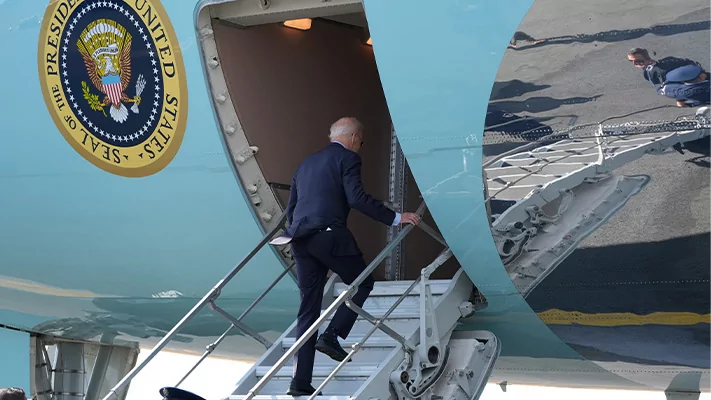As America faces the most unusual of elections, with one candidate evading two assassination attempts and another stepping away from the campaign in favor of his vice president due to reduced capacity, the citizenry would not be out of line to wonder who exactly is in charge at 1600 Pennsylvania Avenue.
Whether it’s due to his mental acuity struggles or the need to allow Vice President Kamala Harris to take the stage in her battle against former President Donald Trump, the Republican nominee, President Joe Biden is largely invisible just ahead of Election Day. While there are historical precedents for sitting presidents retreating from the public eye temporarily or when deciding not to seek election, there are crises in the world now that beg the question if Biden or Harris is leading the country, asking if the public should wonder who’s minding the store.
The most well-known case of a sitting president largely retreating from the public is Woodrow Wilson. According to David Zarefsky, professor emeritus at the Northwestern University School of Communication, Wilson suffered a stroke in 1919 during his second term, forcing him to disappear from the public eye.

Zarefsky sees better examples of a slow retreat like Biden’s, such as the late President Ronald Reagan.
“Wilson didn’t fade from public life,” Zarefsky said. “He had a very serious stroke, and his wife basically took over. The only case of fading that I can think of is Reagan. He was diagnosed with Alzheimer’s disease after he left office. Retrospectively, some of his staffers suggested that he had begun to suffer while he was still in office.”
Matthew Karp, associate professor of history at Princeton University, points out that people don’t remember the multiple cases of presidents serving only one term without losing an election.
“In the [Civil War] antebellum period, it was relatively common for incumbent presidents [to withdraw before a second term], such as John Tyler, James Polk, Millard Fillmore, and Franklin Pierce,” Karp said. “They did so either to step back after one term or because they didn’t receive the nomination of their party. But none of them are direct parallels to the Biden situation, in which the incumbent only stepped down reluctantly, in the middle of the campaign.”
Karp’s instinct tells him that the Lyndon B. Johnson case is the most interesting and possibly the most relevant in relation to Biden. Johnson announced he would discontinue his bid for a second full term in the 1968 presidential election amid violent anti-Vietnam War protests as all signs pointed to overwhelming unpopularity and likely defeat. Most analysts believe Biden had to be convinced of similar futility before finally agreeing to move aside for Harris.
Christopher Capozzola, a history professor at the Massachusetts Institute of Technology, offers another example of a presidential retreat beyond Wilson, Johnson, and Reagan.
“In 1955, President Dwight Eisenhower had a heart attack,” Capozzola said. “The incapacitation was brief, and Ike returned to work — and even won a second term. But that incident [together with Woodrow Wilson’s stroke] led to the ratification of the 25th Amendment.”
That addition to the Constitution didn’t become official until 1967. It lays out how the power of the presidency passes to the vice president. If the sitting head of state dies, resigns, or is impeached and removed from office, the vice president takes over the position. However, the amendment makes clear how an impaired president can be replaced or temporarily relieved of duty at the behest of the vice president and a majority of the president’s Cabinet. If the previous leader never recovers his or her capacity, the vice president remains in power and becomes the de facto commander in chief.
In either case, the vice president becomes the acting president until, or if, the originally elected leader’s powers and duties are restored.
Talk of activating the 25th Amendment proliferated this year as Biden’s public appearances showed signs of declining faculties. Following his difficult June debate against Trump, those alarmed calls reached a fevered pitch before Biden announced he would not run for reelection. Once Harris began her campaign, the already protected president stayed in the background more significantly.
Capozzola highlights another historically prominent case of a missing president that is often ignored by the general public.
“One forgotten instance is Calvin Coolidge, whose teenage son died suddenly in June 1924 while Coolidge was in office,” he said. “According to many accounts, Coolidge, who was already a reserved man with a reputation as ‘Silent Cal,’ retreated even further into his shell and became far less active and engaged for the remainder of his presidency, at times even sleeping many hours a day. Looking backward, we’ll never be able to diagnose this as depression, but we certainly know that his grief caused him to step away from the public eye and his duties.”
While the 25th Amendment has never been called upon, Capozzola explains that a president can remain in office while delegating more powers to the vice president or other Cabinet members, with or without the public’s knowledge.
“In the past, presidents have regularly delegated some of their responsibilities at times when their health was weakened,” he said. “Franklin Roosevelt, for instance, never stepped away from presidential duties but certainly relied heavily on his generals, admirals, and his Cabinet as his health declined in 1944 and 1945.”
While Biden eventually backed out of his campaign and Harris took to the trail, the sitting president retreated from many public appearances. That could be due to a desire to allow the media to focus on a vice president running for the White House, or it might be the Biden administration acknowledging Biden’s health.
With the United States indirectly involved in the war in Ukraine, an American ally in Israel actively fighting on multiple fronts in the Middle East, and hurricanes striking the Southern states, voters are often not seeing their president front and center during times of crisis.
CLICK HERE TO READ MORE FROM THE WASHINGTON EXAMINER
Capozzola leaves it to the electorate to make the call if Biden’s retreat is a call for concern.
“That’s a decision for the American public,” he said. “They should pay attention, for sure, but their attention should include the effectiveness of the administration as a whole. They need to make sure that elected officials carry out their responsibilities and constitutional processes are followed.”























